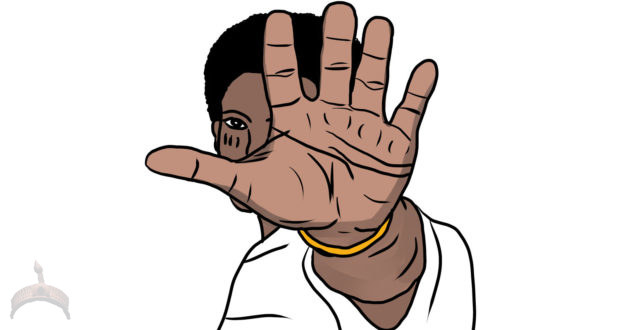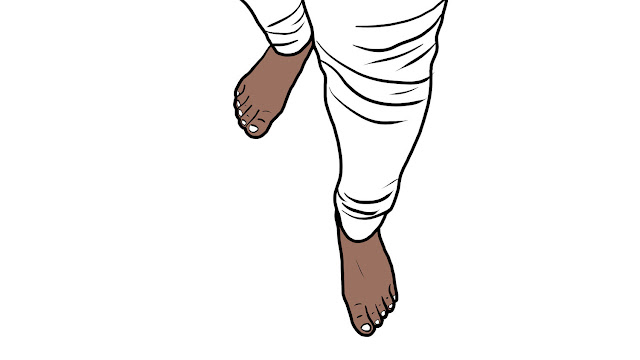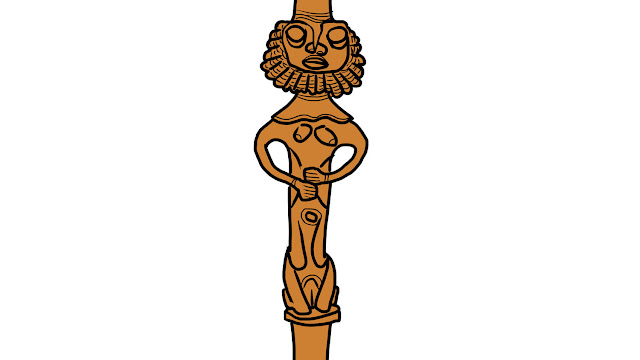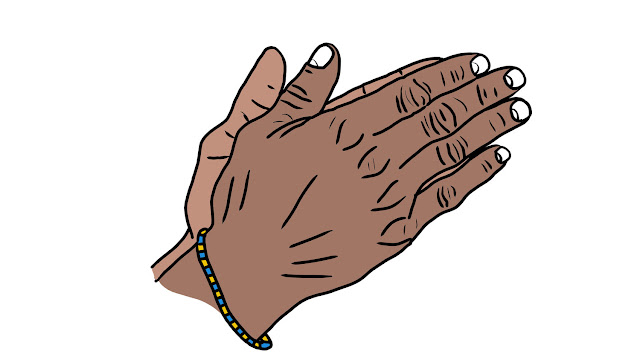ÌFORÍBALẸ̀ (WORSHIP)
Unike “ìdọ̀bálẹ̀, ìyíká” and “ìkúnlẹ̀”, the act of “ìforíbalẹ̀”, literally translated “fi-orí-ba-ilẹ̀”, “putting the head touch the ground”, is exclusively connected to the spiritual world and not used to greet other people. This gesture is reserved for the divine. You get down on your knees, place the hands in front of the body on the ground, lower your head, the buttocks go up, and the forehead touches the ground. It is done in front of Òrìṣà, when you enter a shrine or visit a friend’s or Babaláwo’s house. The gesture can be used in rituals, or typically it is performed by Muslim Yorùbá in their prayers. To greet Òrìṣà, men can also combine it with the idọ̀bálẹ̀, the ìkúnlẹ̀ is involved anyhow. Be aware that this greeting is not done to all of the Òrìṣà, usually it is done for those who live inside the house.
ÌKÀNSẸ̀ (TAPPING WITH ONE FOOT)
The ìkànsẹ̀ is a small ritual greeting gesture that can sometimes be necessary when one enters a shrine or other Òrìṣà grounds. The person stands still and then taps the ground in front of him or her with the the left foot and then puts the feet together. This is repeated three times, and then one can enter. This gesture can be used instead of a full greeting to people in certain occasions.
GREETING GESTURES OF ÒRÌṢÀ SOCIETIES
A variety of complex or simple greeting gestures is used in Òrìṣà societies in Yorùbáland and in the diaspora to identify oneself as an initiate. One example, that is generally known publicly through artworks and often featured in wooden carvings, is the gesture showing two fists, held one above the other (the left on top of the right one) in front of the solar plexus. It is a ritual sign identifying Ogbóni members. This article does not mention further of those greetings, as they are considered esoteric knowledge, known to the people involved and are not performed by outsiders.
Ẹ̀BẸ̀, TỌRỌ, ṢAGBE (PLEADING, EXCUSING, BEGGING)
“Supplication to the gods is an integral aspect of Yorùbá life; these supplications are offered with gestures. When not asking the gods for intervention in their affairs, they may have occasion to beg people for help of forgiveness”, writes Augustine Agwuele in “A repertoire of Yoruba hand and face gestures”. There are three types of gestures of pleading or begging.
RAWỌ́ (RUBBING THE HANDS)
A widespread gesture is the rubbing of the palms of the hands in an up-and-down motion in front of the torso or the face while praying for assistance by the divine forces. It looks like a slower version of the movement when someone is feeling cold and trying to warm up his hands, in Yorùbá “fi ọwọ́ kan ọwọ́ para”. This gesture is used in divination, holding the palm-kernels, the cowries or kola-nuts in the hands, rubbing them, praying and invoking the Òrìṣà, before the moment of casting arrives. In my opinion, but this is speculation, this is the original root of this prayer gesture in Yorùba culture. At least, it is always combined. Rubbing the hands can also be performed in daily life situations, in the moment when one just is about to receive something and expresses “I appreciate, I am thankful”.
 Ọmọ Oòduà Naija Gist | News From Nigeria | Entertainment gist Nigeria|Networking|News.. Visit for Nigeria breaking news , Nigerian Movies , Naija music , Jobs In Nigeria , Naija News , Nollywood, Gist and more
Ọmọ Oòduà Naija Gist | News From Nigeria | Entertainment gist Nigeria|Networking|News.. Visit for Nigeria breaking news , Nigerian Movies , Naija music , Jobs In Nigeria , Naija News , Nollywood, Gist and more














(Y)